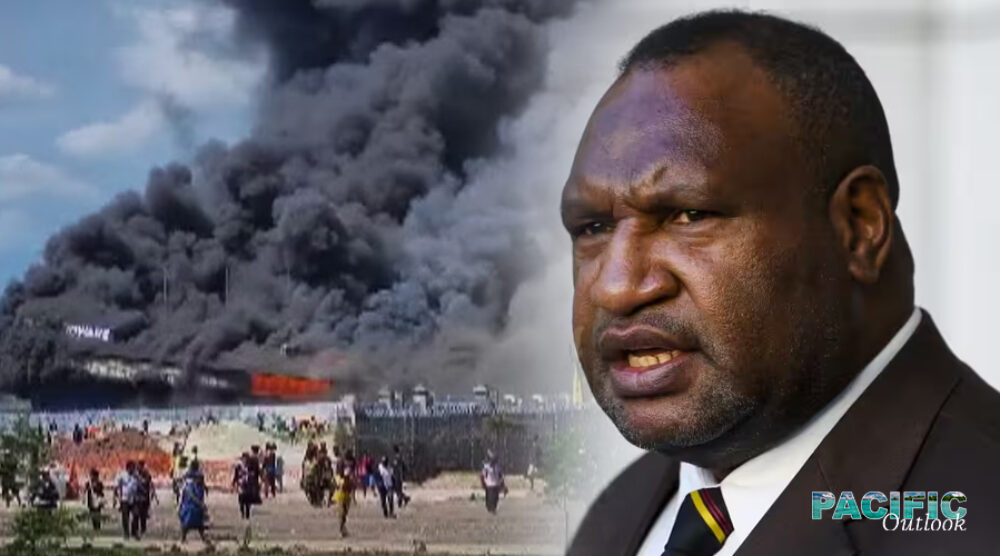‘Pent up rage’ is a term that springs to mind after recent violent looting in Papua New Guinea (PNG) and Port Moresby. ‘Opportunism’ is another.
A supposed computer glitch on the national government’s payroll system left many public servants — including soldiers and police — without pay. In a nation of almost 12 million, where an overwhelming majority are living kina to kina (PNG’s currency), the error has sparked an eruption that, in the words of Port Moresby Governor Powes Parkop, is “unprecedented” and “never happened before in the history of our city and our country.”
Being born in Port Moresby — and living on and off there over the years — I incorrectly predicted that the looting would be localised to the national capital. I was woefully wrong, with violence also spreading to PNG’s second largest city Lae, where apparently seven have been killed — and otherwise relatively peaceful towns such as Kavieng in New Ireland Province.
There is clearly something dark emerging in PNG, which is challenging the fundamentals of its democratic, cultural, and social settings. Violence sadly is not new to the South Pacific nation — tribal fighting, a ten-year civil war in the province of Bougainville, matched with a small police force and ongoing law and order problems, point to perennial security and stability issues in PNG. Yet the contagion of the recent eruptions — where individuals feel permitted to loot in one town because it’s happening in another — is a curious and concerning development.
The political scientist Francis Fukuyama observed of PNG that it has a major collective action problem, which is the result of its severe cultural fragmentation. Fukuyama labelled this “both a blessing, and an obstacle, to development,” primarily because it meant there was no dominant ethnic group to seize power and, at the same time, no largescale political incentive to deliver public goods beyond narrow kinship circles.
Yet this recent violence — PNG’s new violence — partly challenges this position, because it shows an unusual form of collective action, which is at odds with common small-scale and disconnected disorder experienced in PNG. I am not suggesting here that nationwide looting is any way organised — it is clearly not. But its contagious nature is of high concern.
In terms of a way forward from here, a starting point to address such breakdowns is to massively increase the size of PNG’s police force. This is unpopular among some development experts, yet there are clearly kinetic law and order issues — seen over the past week — that require immediate kinetic responses. Only state law enforcement can and should ultimately administer justice in PNG, not private citizens, shop owners or private security firms.
The powder keg-type eruption also points to an overall anger and resentment that is palpable in PNG. Rolling blackouts that leave families stifling in heat, hospitals that have no medicine or equipment, roads that can’t be driven on, schools that have no basic amenities and whose teachers go unpaid, all point to massive failures and competency issues among all tiers of government. In the private sector, the issues amount to a similar frustration — constant flight cancellations and delays, black spot network failures, astronomical data and real estate prices, fuel and currency shortages, and banking ‘technical errors’ at crucial holiday times, are just a few of the examples of the frustrations of contemporary life in PNG.
While this in no way justifies the choices of handfuls of individuals in the past week, it does become easier to see why resentment – as a general attitude and response to government failure – is becoming so widespread. Citizens in any democracy can see legitimacy in government when it at least performs competently. Yet with the kinds of failures cited above, legitimacy wanes and frustration builds, creating a troubling sense of ‘unity in disappointment and resentment’.
Sadly, this will only become increasingly difficult to arrest in PNG. Prime Minister James Marape’s Government clearly has its work cut out for it in 2024. Calls for a vote of no confidence are mounting, with six MPs at the time of writing within the Marape government resigning. While Marape still has a strong majority, the fact that his power rests on an increasingly brittle political alliance will no doubt be on the minds of ministers.
Ultimately, it is a much less optimistic start for PNG than last year, when Australian Prime Minister Anthony Albanese addressed PNG’s national parliament, setting the tone for an internationally focused PNG, inking international security deals and agreements. On the events of last week, former PNG Prime Minister Peter O’Neill has already taken aim at the Australian aid program and for its direct PNG government funding “not helping the safety and security of our country that is now virtually at war.” This casts light on how foreign assistance — and the agreements inked last year — may be able to assist PNG in addressing its increasingly desperate situation.
Sean Jacobs is a Papua New Guinean-born Brisbane-based writer, government relations and public policy specialist.








